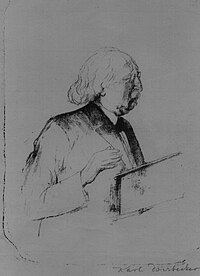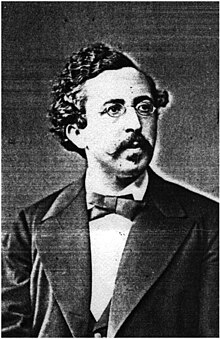赫尔曼·科恩
| 赫尔曼·科恩 | |
|---|---|
 科恩画像(by Karl Doerbecker) | |
| 出生 | 1842年7月4日 科斯维希,安哈尔特(德国) |
| 逝世 | 1918年4月4日 (享年75岁) 柏林, 德国 |
| 国籍 | 德国 |
| 母校 | 布雷斯劳犹太神学院 布雷斯劳大学 柏林洪堡大学 哈勒-维滕贝格大学 |
| 科学生涯 | |
| 博士生 | 恩斯特·卡西尔, 保罗·纳托普, 汉斯·凯尔森 |

赫尔曼·科恩(德語:Hermann Cohen,1842年7月4日—1918年4月4日),德国犹太哲学家,新康德主义马堡学派的创始人之一,通常被称为“十九世纪最重要的犹太哲学家”。
生平
科恩出生于安哈尔特的科斯维希。他早年开始学习哲学,很快就以对康德的深刻理解而小有名气。科恩曾就读于德绍的大学预科、布雷斯劳犹太神学院、布雷斯劳大学、柏林大学和哈勒大学。 1873年,科恩成为马堡大学哲学系的无薪讲师,论文题目是《康德前批判文章中的系统观念与批判观念论的关系》( Die systematischen Begriffe in Kant's vorkritischen Schriften nach ihrem Verhältniss zum kritischen Idealismus)。 1875年科恩被选为马堡大学副教授,次年升为正教授(参见“德国学术系统”)。
1902年11月在柏林首次举行的“犹太教科学促进会”,科恩是创始人之一。
科恩编辑出版了弗里德里希·艾尔伯特·兰格(Friedrich Albert Lange)的最后哲学著作《逻辑学研究》(莱比锡,1877)。此外,科恩还编辑了兰格的《唯物主义史与对其当前重要性的批判》,并写了几个版本的长篇引言和批判性补充。
科恩致力于解释康德的经验理论、伦理学基础和美学基础,并于1902年开始出版他自己的三卷系统哲学的重要著作:《逻辑学与纯粹认识》(1902) 、《伦理学与纯粹意志》(1904)、《美学与纯粹感受》(1912)。计划关于心理学的第四卷一直没有写成。
科恩还写了一些关于犹太教的著作,包括一系列小册子,如《安息日的文化历史意义》(1881)、《关于犹太问题的坦白》(柏林,1880),以及文章“犹太人伦理问题”(《月刊》,xliii,1899,pp. 385-400,433-449)、 “上帝和人类观念中的爱与正义”(《犹太历史与文学年鉴》,III,1900,pp. 75–132)、“自律与自由”(《大卫·考夫曼纪念手册》,1900)。
科恩最知名的犹太著作有:《起源于犹太教的理性宗教》(1919)[1]、《德国文化与犹太文化》、《塔木德中的博爱》以及《迈蒙尼德的伦理学思想》。《塔木德中的博爱》一文是根据马堡皇家地方法院(3d ed., Marburg, 1888)的要求写成的。科恩有关犹太思想的著作收录在他的《犹太文集》(三卷本,布鲁诺·施特劳斯,柏林,1924)中。 目前,科恩的学术著作正在进行新版汇编,由Helmut Holzhey,Hartwig Wiedebach等人负责编辑(Olms, Hildesheim 1977 ff.)。在这些犹太著作中,《理性与希望:赫尔曼·科恩犹太作品选集》已经被翻译成英文( Eva Jospe, NY 1971)。
对于犹太复国主义及其建立犹太国家、“让犹太人回到历史”的宏大抱负,科恩曾直言不讳的反对。科恩认为,犹太教内在地具有一种历史性,其精神和道德使命远远超越了犹太复国主义的民族主义目标。
尽管科恩对犹太复国主义抱有反对态度,特拉维夫还有一条“赫尔曼·科恩街”。
科恩去世后葬于柏林的Weißensee公墓。
著述
- English translations are indented.
- "Die Platonische Ideenlehre Psychologisch Entwickelt," in "Zeitschrift für Völkerpsychologie," 1866, iv. 9 ("Platonic Ideal Theorie Psychologically Developed")
- "Mythologische Vorstellungen von Gott und Seele," ib. 1869 ("Mythological Concepts of God and the Soul")
- "Die dichterische Phantasie und der Mechanismus des Bewusstseins," ib. 1869 ("Poetic Fantasy and Mechanisms of Consciousness")
- Jüdische Schriften. Introduction by Franz Rosenzweig, edited by Bruno Strauss. Berlin, C. A. Schwetschke: 1924.
- Excerpts have been published in English translation: Reason and Hope: Selections from the Jewish Writings of Hermann Cohen. Translated by Eva Jospe. Cincinnati: Hebrew Union College Press, 1993. (Originally published New York: Norton, 1971, in series: B'nai B'rith Jewish Heritage Classics, with additional material.)
- "Zur Kontroverse zwischen Trendelenburg und Kuno Fischer," ib. 1871 ("On the controversy between Trendelenburg and Kuno Fischer")
- Kant's Theorie der Erfahrung, Berlin, 1871; 2d ed., 1885 ("Kant's Theory of Experience").
- [One central chapter of the 1885 edition is translated as 2015, "The Synthetic Principles," D. Hyder (trans.), in S. Luft (ed.), The Neo-Kantian Reader, Oxford: Routledge.]
- Kant's Begründung der Ethik, Berlin, 1877 ("Kant's Foundations of Ethics")
- "Platon's Ideenlehre und die Mathematik," Marburg, 1878 ("Mathematics and Theory of Platonic Ideals")
- Das Prinzip der Infinitesimalmethode und seine Geschichte: ein Kapitel zur Grundlegung der Erkenntnisskritik, Berlin, 1883 ("The Principle of the Method of Infintesmals and its History: A Chapter Contributed to Critical Perception")
- A short selection is translated as 2015, "Introduction," D. Hyder and L. Patton (trans.), in S. Luft (ed.), The Neo-Kantian Reader, Oxford: Routledge.
- Religion der Vernunft aus den Quellen des Judentums. (1919, repr. Fourier: 1995)
- Religion of Reason out of the Sources of Judaism. Translated, with an introduction, by Simon Kaplan. Introductory essay by Leo Strauss. New York: F. Ungar, 1972.
- "Spinoza über Staat und Religion, Judentum und Christentum" (1915).
- Spinoza on State and Religion, Judaism and Christianity. Translated and with an introduction by Robert S. Schine. Jerusalem: Shalem Press, 2014.
- "Von Kant's Einfluss auf die Deutsche Kultur," Berlin, 1883 ("On Kant's Influence on German Culture")
- Kant's Begründung der Aesthetik, Berlin, 1889 ("Kant's Foundations of Aesthetics")
- "Zur Orientierung in den Losen Blättern aus Kant's Nachlass," in "Philosophische Monatshefte," 1890, xx. ("An Orientation to the Loose Pages from Kant's Literary Estate")
- "Leopold Schmidt," in "Neue Jahrbücher für Philologie und Pädagogik," 1896, cliv.
参考文献
- ^ Metzler Philosophical Lexikon, article on Hermann Cohen
扩展阅读
- Reiner Munk, Hermann Cohen's Critical Idealism. Dordrecht: Springer, 2005. ISBN 978-1-4020-4046-7.
- Irene Abigail Piccinini, Una guida fedele. L'influenza di Hermann Cohen sul pensiero di Leo Strauss. Torino: Trauben, 2007. ISBN 978-88-89909-31-7.
- Bienenstock, Myriam Cohen face à Rosenzweig. Débat sur la pensée allemande (Paris, Vrin, 2009)
- Hermann Cohen: l'idéalisme critique aux prises avec le matérialisme (special issue of the journal Revue de métaphysique et de morale, ISSN 0035-1571), edited by Myriam Bienenstock, Paris, PUF, 2011, 141 pages.
- Liisa Steinby, "Hermann Cohen and Bakhtin's early aesthetics," Studies in East European Thought, 63,3 (2011), 227–249.
- George Y. Kohler, "Finding God's Purpose - Hermann Cohen's Use of Maimonides to Establish the Authority of Mosaic Law", in: Journal for Jewish Thought and Philosophy 18:1 (2010), p. 85–115.
- Stéphane Moses (ed. et al.) Hermann Cohen's Philosophy of Religion; International Conference in Jerusalem 1996, Hildesheim 1997.
- Steven Schwarzschild "Franz Rosenzweig's Anecdotes about Hermann Cohen", in: Gegenwart im Rückblick: Festgabe für die Jüdische Gemeinde zu Berlin 25 Jahre nach dem Neubeginn, ed. H. A. Strauss and K. R. Grossman, Heidelberg, 1970, S. 209–218.
- Steven Schwarzschild "The Democratic Socialism of Hermann Cohen", HUCA 27 (1956).
- Steven Schwarzschild "Germanism and Judaism - Hermann Cohen's Normative Paradigm of the German-Jewish Symbiosis", in: Jews and Germans from 1860 to 1933, ed. David Bronsen, Heidelberg 1979.
- Andrea Poma, The Critical Philosophy of Hermann Cohen, Albany 1997.
- Andrea Poma "Hermann Cohen: Judaism and Critical Idealism", in: Michael L. Morgan and Peter Eli Gordon (eds.) The Cambridge Companion to Modern Jewish Philosophy, Cambridge 2007.
- Michael Zank The Idea of Atonement in the Philosophy of Hermann Cohen, Providence 2000.
- Almuth Bruckstein, Cohen's Ethics of Maimonides, translated with commentary, Madison, Wisc. 2004.
- Lawrence Kaplan, "Hermann Cohen's Theory of Sacrifice", in: "Religion der Vernunft aus den Quellen des Judentums"; Tradition und Ursprungsdenken in Hermann Cohens Spätwerk;. (ed. Helmut Holzhey et al.), Hildesheim 2000.
外部链接
- Hermann-Cohen-Gesellschaft, promotes research on Hermann Cohen's work and help bring his philosophy to bear in the forum of current debate.
- Hermann Cohen Archives at the University of Zurich, Switzerland
- The Hermann Cohen Society of North America* 扎尔塔, 爱德华·N (编). 《斯坦福哲学百科全书》.
- 在Find a Grave上的赫尔曼·科恩
- , JewishGates
| |||||||||||||||||||||||||||
Text is available under the CC BY-SA 4.0 license; additional terms may apply.
Images, videos and audio are available under their respective licenses.
